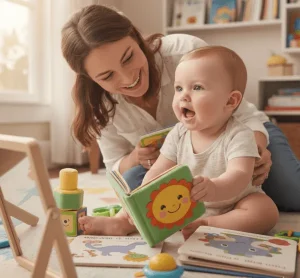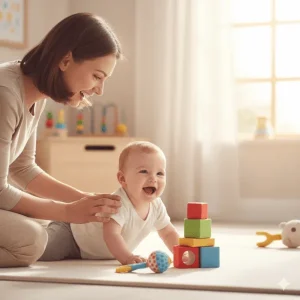The Role of Self-Care in Maintaining Healthy Relationships
By Prapoorna M
Last Updated: February 29, 2024
In our continuous quest for a balanced and fulfilling life, the concept of self-care often emerges as a beacon of hope and rejuvenation. This isn’t just about indulging in occasional pampering or leisure activities; it’s about embracing a lifestyle that prioritizes our physical, emotional, and mental well-being. Imagine self-care as a nurturing garden – the better we tend to it, the more bountiful it becomes, not just for us but for those around us too.
By nurturing ourselves, we don’t just bloom in isolation; we create an environment where our relationships can thrive too. Just as a well-watered plant can share its vitality with its surroundings, well-cared-for individuals can infuse their relationships with the same vibrancy and health.
Self-care and relationships are interlinked in a delicate, yet powerful way. When we take time to understand and fulfill our own needs, we equip ourselves with the tools to engage more meaningfully and compassionately with others. It’s a journey that begins within and radiates outward, touching every bond we form.
Book Relationship Counselling now.
Understanding Self-Care
The Multifaceted Nature of Self-Care
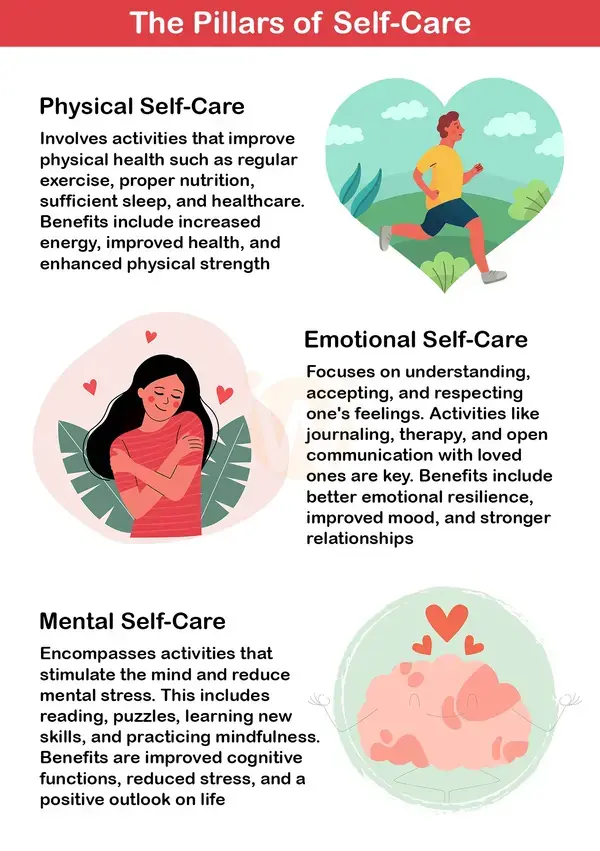
When we talk about self-care, it’s easy to picture a relaxing day at the spa or a quiet evening with a good book. But self-care encompasses so much more. It’s a multidimensional practice, nurturing our physical, emotional, mental, and spiritual well-being. Each of these aspects plays a crucial role in how we experience life and engage with others.
- Physical Self-Care: This involves taking care of your body. Think of it as tuning a musical instrument; exercise, nutrition, and rest are akin to keeping the strings of your guitar in perfect harmony. It’s not just about looking good; it’s about feeling strong and energized.
- Emotional Self-Care: This is all about understanding and respecting your feelings. It’s like being a compassionate friend to yourself, allowing space for emotional expression and self-compassion. Activities like journaling, therapy, or simply talking to a friend can be powerful tools for emotional self-care.
- Mental Self-Care: This facet focuses on nourishing your mind. Just as a garden needs good soil and sunlight, your mind needs stimulating activities, adequate rest, and positive thinking to flourish. For more insights on managing mental health, explore our detailed article on dealing with anxiety and depression.
- Spiritual Self-Care: This might mean different things to different people. For some, it’s meditation or prayer; for others, it could be connecting with nature or engaging in a creative hobby. It’s about finding and nurturing a sense of connection to something greater than oneself.
Explore various aspects of spiritual wellness and meditation in our detailed discussion here.
Beyond Pampering: Self-Care as a Form of Self-Respect
Self-care is more than just pampering; it’s an act of self-respect. It’s about acknowledging your worth and giving yourself the same care and attention that you so generously give to others. By regularly engaging in self-care practices, you’re sending a message to yourself and the world that you value your health and happiness
The Impact of Self-Care on Relationships
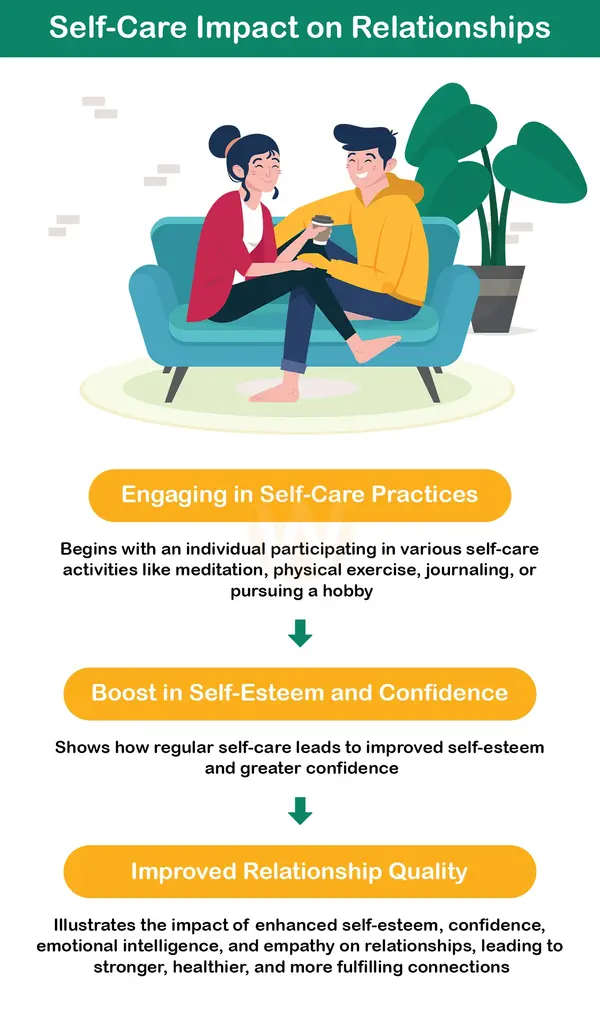
Enhancing Self-Esteem and Confidence Through Self-Care
One of the most significant “Self-care benefits in relationships” is the enhancement of self-esteem and confidence. When you take the time to care for yourself, you’re essentially telling yourself that you matter. This boosts your self-worth and makes you more confident in your interactions with others. A confident person brings positivity and strength to their relationships, making them more fulfilling and robust.
Cultivating Healthier and More Balanced Relationships
A strong sense of self, nurtured through self-care, is the foundation of healthier, more balanced relationships. It equips you with the tools to be more empathetic, patient, and understanding. By taking care of your needs, you reduce dependence on others for emotional fulfillment, which in turn creates a more equal and healthy dynamic in your relationships.
For more on improving communication in relationships, check out our article on effective communication strategies.
Self-Care Strategies for Individual Wellness
Embracing Simple Self-Care Practices
Self-care doesn’t have to be elaborate or time-consuming. Here are some simple, yet effective strategies to enhance your physical and mental well-being:
- Physical Well-being: Start with the basics like adequate sleep, a balanced diet, and regular exercise. Even a short daily walk or stretching session can do wonders. Remember, a healthy body is the vessel for a healthy mind.
- Mental Well-being: Give yourself permission to take mental breaks. This could be as simple as a few minutes of deep breathing or enjoying a quiet cup of tea. Indulging in hobbies that relax your mind, like reading or gardening, can also be incredibly therapeutic.
Gain more insights into simple wellness practices with our guide on maintaining a balanced diet.
Simple Self-Care Practices
| Type of Well-being | Practices | Benefits |
|---|---|---|
| Physical | Regular exercise (e.g., walking, yoga) | Improves physical health, boosts energy levels |
| Adequate sleep | Enhances brain function, emotional regulation | |
| Balanced diet | Provides necessary nutrients, maintains health | |
| Hydration | Essential for bodily functions, improves skin health | |
| Mental | Mindfulness activities (e.g., meditation) | Reduces stress, increases focus and calmness |
| Reading for pleasure | Expands knowledge, relaxes the mind | |
| Engaging in hobbies | Provides a sense of accomplishment, reduces anxiety | |
| Journaling | Helps in self-reflection, organizes thoughts | |
| Taking mental breaks (e.g., short walks, tech breaks) | Reduces mental fatigue, boosts creativity |
The Power of Mindfulness and Stress Management
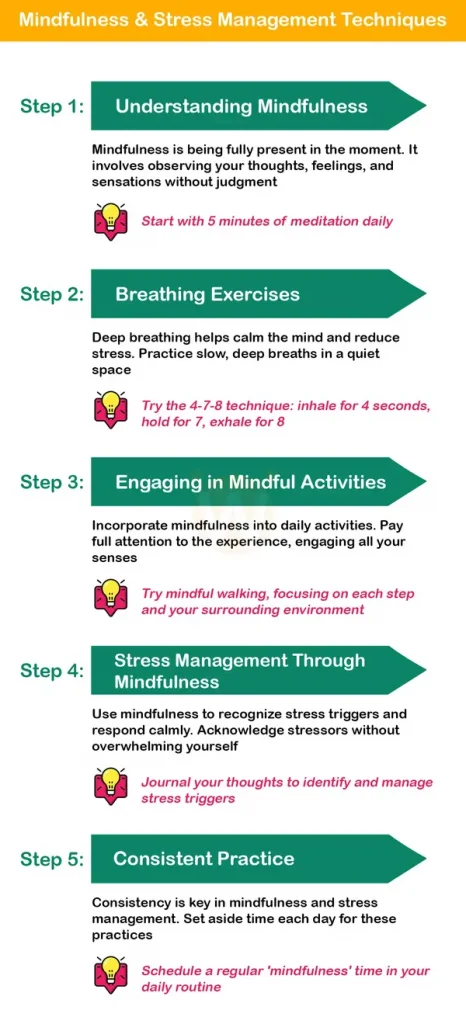
Mindfulness is about being present in the moment. Practices like meditation, yoga, or even mindful eating and walking, help anchor you in the now, reducing stress and enhancing awareness. Try incorporating short mindfulness exercises into your daily routine – they can be as brief as five minutes!
Stress management is also crucial. Identify stress triggers and develop healthy coping mechanisms. This could be anything from journaling to talking to a trusted friend, or seeking professional advice. For more tools and resources on mindfulness and stress management, WellnessHub offers a wealth of information to guide you on your journey.
Also Read: Feeling stressed in your relationships? Tips to handle
Personal Growth: A Continuous Journey
Personal growth is an ongoing process. Set aside time for self-reflection and personal development activities. Learning new skills, reading insightful books, or even attending workshops can contribute significantly to your personal growth.
Explore our resources on personal development and growth, such as this article on the importance of self-improvement.
Self-Care in the Context of a Relationship
Maintaining Individuality and Personal Space
In any healthy relationship, it’s important to maintain a sense of individuality. Respecting personal space and allowing yourself and your partner the freedom to pursue individual interests is key. It’s like tending to two separate gardens side by side – each needs its own care to flourish.
Read more: Advice for Newlyweds | Tips to a great marriage
Communication Skills and Setting Boundaries
Effective communication is the cornerstone of any strong relationship. It involves not only talking but active listening. Be open and honest with your feelings, and encourage your partner to do the same. Setting boundaries is equally important. Clearly communicate your needs and limits, and respect those of your partner. This fosters a relationship based on mutual respect and understanding.
Emotional Intelligence in Relationships
Emotional intelligence involves recognizing your emotions and those of your partner. It’s about responding with empathy and understanding. By taking care of your emotional well-being through self-care, you enhance your ability to engage empathetically in your relationship.
Balancing Self-Care and Partner Care
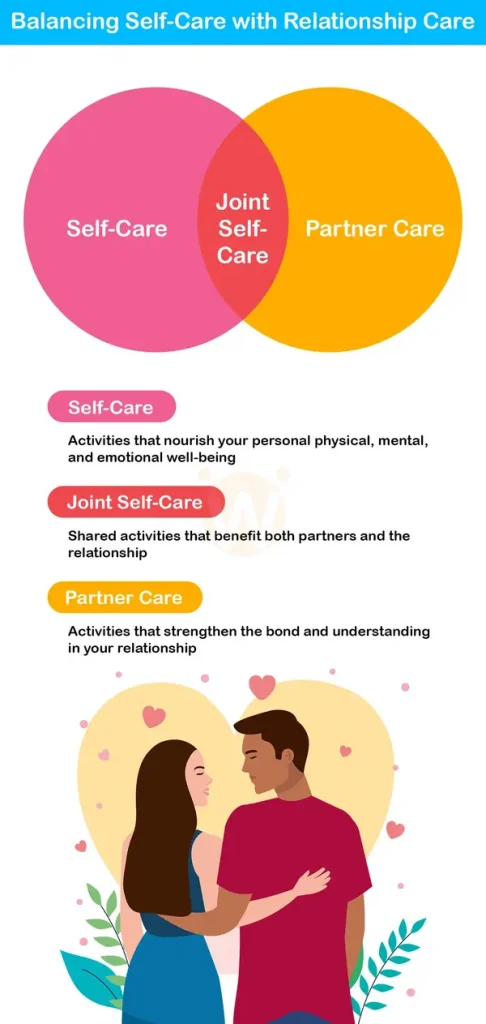
Navigating the Self-Care and Partner Care Balance
A common query that often arises is, “Is it selfish to prioritize self-care in a relationship?” The simple answer is no. Prioritizing self-care isn’t about neglecting your partner; it’s about replenishing your own well-being so you can be more present and engaged in the relationship. Think of it as securing your own oxygen mask first before assisting others.
Read more What is important in a relationship? 10 factors that make or break!
Strategies for Harmonizing Self-Care with Caring for a Partner
- Communicate Your Needs: Openly discuss with your partner why self-care is important to you. It helps them understand your perspective and supports your journey together.
- Plan Together: Involve your partner in your self-care plans. Whether it’s setting aside time for individual activities or planning a joint activity, ensure it’s a shared decision.
- Joint Self-Care Activities: Engage in self-care activities that you both enjoy. This could be a weekly yoga class, cooking a healthy meal together, or simply taking a walk in the park. These shared experiences can strengthen your bond.
Find out more about joint self-care activities in our detailed piece on nurturing relationships.”
Overcoming Relationship Challenges through Self-Care
Preventing Relationship Burnout with Self-Care
Continual self-care practices play a crucial role in preventing relationship burnout. When both partners take time for self-rejuvenation, they bring renewed energy and enthusiasm to the relationship. It’s about maintaining your individuality and well-being to keep the relationship fresh and dynamic.
Combating Codependency through Self-Care
Self-care is a powerful tool in overcoming codependency in relationships. By focusing on personal growth and self-sufficiency, you foster a healthier, more independent you. This independence is key to a balanced relationship where both partners support each other without losing their sense of self.
Incorporating self-care into your life isn’t just about personal wellness; it’s about crafting a relationship that is resilient, supportive, and deeply connected. By prioritizing self-care, you and your partner can navigate the ups and downs of your journey together with grace and strength.
Building Self-Worth for Healthier Relationships
The Vital Role of Self-Worth and Confidence
At the heart of fulfilling relationships lies a strong sense of self-worth and confidence. When you value yourself and recognize your worth, it reflects in how you interact with others. Relationships thrive when both partners feel confident and valued. It’s like a dance where each person’s self-assured steps make the dance more harmonious and synchronized.
Know more on The 5 Phases of a Relationship every couple goes through
How Self-Love Transforms Relationships
Embracing self-love is not just about feeling good about yourself. It’s about establishing a foundation for more authentic and deeper connections. When you love and accept yourself, you set a standard for how you want to be treated by others. This self-love fosters relationships grounded in mutual respect and genuine affection. Imagine a relationship where both partners are comfortable in their skin – it’s a relationship filled with sincerity and a deep understanding of each other’s true selves.
Read more about the transformative power of self-love in relationships in our article here.
Incorporating WellnessHub in Your Self-Care Journey
Discovering WellnessHub: A Companion in Self-Care
As you embark on your self-care journey, having the right resources and support is essential. This is where WellnessHub steps in. Think of WellnessHub as your personal wellness assistant, offering a variety of tools and resources tailored to enhance your self-care routine.
Leveraging WellnessHub for Relationship Wellness
WellnessHub understands that relationship wellness is a critical component of overall well-being. Whether you’re seeking advice on improving communication, setting boundaries, or simply finding activities to enjoy with your partner, WellnessHub offers a plethora of resources. From insightful articles to interactive tools, it’s a platform that supports and enriches your journey towards healthier relationships.
Conclusion: Embracing Self-Care for Relationship Harmony
As we’ve journeyed through the various facets of self-care and its undeniable influence on the quality of our relationships, one thing is crystal clear: self-care is not just a solitary act of personal indulgence but a cornerstone for nurturing healthy, satisfying connections with those we cherish.
The importance of self-care in fostering healthy relationships cannot be overstated. By prioritizing our own mental, physical, and emotional well-being, we not only enhance our capacity to love and support ourselves but also significantly improve our ability to engage in meaningful, fulfilling relationships. Remember, a well-nourished individual brings a wellspring of energy, understanding, and compassion to their interactions, enriching the bond shared with others.
Now, we encourage you, our dear readers, to place a gentle yet firm focus on your well-being. View self-care as an essential, non-negotiable aspect of your life. This commitment to yourself is the first step toward cultivating stronger, more resilient connections with your loved ones.
And for those seeking further guidance and resources to navigate this essential journey of self-care and relationship wellness, WellnessHub stands ready as your ally. Dive into our diverse range of articles, tools, and resources that offer deeper insights and practical tips on embracing self-care in every aspect of your life.
Let’s make self-care a priority, not just for our own sake, but for the health and happiness of our relationships. Visit WellnessHub today, and take the next step in your journey towards a balanced, joyful life filled with meaningful connections.
Frequently Asked Questions
1. What is Self-Care and Why is it Important?
Self-care involves practices and activities that we engage in regularly to reduce stress and maintain and enhance our short and long-term health and well-being. It’s important because it helps improve our physical, emotional, mental, and spiritual health, impacting our quality of life and relationships positively.
2. How Does Self-Care Benefit Relationships?
Self-care enhances self-esteem and confidence, which can lead to healthier, more balanced relationships. When individuals are well-cared-for, they can engage more empathetically and compassionately with others, creating a positive impact on their personal interactions and relationships.
Learn more about how self-care positively impacts relationships in our article on the role of self-care in enhancing relationship dynamics.
3. Can Self-Care Help in Personal Growth?
Yes, self-care is essential for personal growth. It involves activities that nurture personal development, including learning new skills, self-reflection, and engaging in activities that stimulate the mind and soul, contributing to overall personal improvement.
Discover the connection between self-care and personal development in our guide on personal growth and self-improvement.
4. What Are Some Simple Self-Care Practices for Individual Wellness?
Simple self-care practices include ensuring adequate sleep, maintaining a balanced diet, regular exercise, taking mental breaks, engaging in hobbies, and practicing mindfulness and stress management techniques.
5. How Can Mindfulness Contribute to Self-Care?
Mindfulness helps in being present in the moment, reducing stress, and enhancing overall awareness. It involves practices like meditation, yoga, and mindful eating, which anchor individuals in the now, improving mental and emotional well-being.
Read about the benefits of mindfulness in self-care in our in-depth discussion here.
6. What Role Does Emotional Intelligence Play in Relationships?
Emotional intelligence is key in recognizing and responding to one’s emotions and those of others. It involves empathy and understanding, which are critical in healthy and fulfilling relationships.
7. Is Prioritizing Self-Care in a Relationship Selfish?
No, prioritizing self-care in a relationship is not selfish. It’s about ensuring personal well-being to be more present and engaged in the relationship, thus benefiting both partners.
8. How Can WellnessHub Assist in My Self-Care Journey?
WellnessHub offers a variety of tools and resources tailored to enhance self-care routines. It supports relationship wellness by providing advice on communication, setting boundaries, and finding joint activities for couples.
9. What Are the Benefits of Self-Love in Relationships?
Self-love establishes a foundation for more authentic and deeper connections. It sets a standard for how individuals want to be treated, fostering relationships grounded in mutual respect and genuine affection.
Learn about the transformative power of self-love in our article focusing on self-love and its impact on relationships.
10. How Can Self-Care Prevent Relationship Burnout?
Regular self-care practices can prevent relationship burnout by maintaining individuality and well-being, thus bringing renewed energy and enthusiasm to the relationship and keeping it fresh and dynamic.
About the Author:
Prapoorna Mangalampalli
M.Sc., M.A., (Dual Masters in Psychology & English) – Counselor (6+ years of experience)
Prapoorna armed with a passionate dedication fueled by dual Master’s degrees in Psychology and English, Prapoorna sheds light on and elevates human experiences. Over 6+ years of experience fuel her insightful approach to counseling, offering profound empathy and guidance across diverse areas like online, marital, relationship, child, family, and career counseling.
At Wellness Hub, she thrives in a team environment that values innovation, compassion, and achieving results for their clients.
Connect with Prapoorna to learn how she can help you or your loved one find their voice and build a brighter future.
Book your Free Consultation Today
Parent/Caregiver Info:
Client’s Details:
* Error Message








